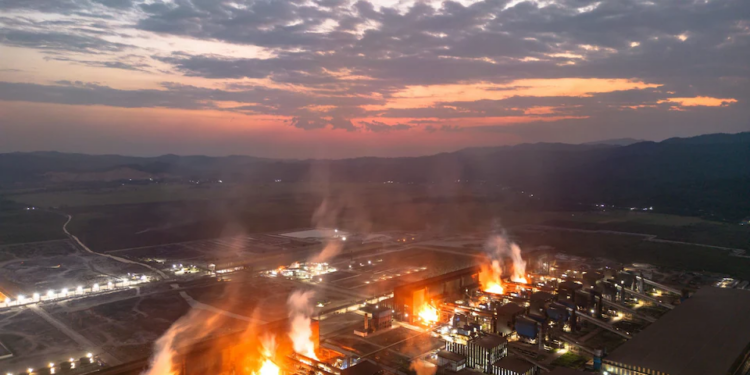Swathes of rainforest and coral reefs are being destroyed by a nickel mining boom in Indonesia sparked by the Net Zero race to transition away from fossil fuels. The Telegraph has more.
Across the country, a major drive to exploit the country’s abundant natural resources is underway. These photographs [below] capture the sheer scale of the production process.
Rows of chimneys, belching smoke and fumes, tower over the schools and houses of what were once rural communities in scenes recalling the work of L.S. Lowry, whose paintings captured life in the industrial districts of North West England in the mid-20th century.
Indonesia is now the world’s largest nickel producer, with 15% of the globe’s lateritic nickel resources – typically low-grade deposits found near the surface.
But demand is still soaring in tandem with the rise of the electric vehicles (EVs), which depend on it for their batteries.
The International Energy Agency (IEA) predicts that global demand for the metal will grow at least 65% by 2030, and EVs and battery storage are set to take over from stainless steel as the largest end user of nickel by 2040.
Billion dollar Chinese firms anchor the nickel market in Indonesia, but they are often fed cheap ore by hundreds of smaller, mostly locally-owned mines that dot the rainforest. These mines have transformed once-peaceful agrarian villages and communities, providing economic opportunity but a health and environmental crisis looms from pollution.
In just three years, Indonesia has signed more than a dozen deals worth more than $15 billion for battery materials and electric vehicle production with global manufacturers including Hyundai, LG and Foxconn.
In 2021, Indonesia unveiled a new nickel smelter in North Morowali Regency of Central Sulawesi. It has been equipped to process 13 million tons of nickel ore annually.
Sulawesi, an Indonesian island east of Borneo, is a peaceful land known for its pristine coral reefs, dive sites and prehistoric cave paintings. But it is fast becoming an industrial heartland.
The chimneys of PT Obsidian Stainless Steel, a nickel processing complex, spew smoke into the air 24-hours a day, with flames lighting up the night sky.
Worth reading in full.
Of course, modern civilisation is built on industry so we mustn’t be overly precious about the natural world. But such extensive mining and industrial activities connected with the drive to Net Zero gives the lie to the oft-repeated claim that battery and electric technologies are ‘green’ and ‘good for the planet’.
The intense environmental destruction also highlights the double standards of those who make a big fuss about rainforest and coral reef degradation when they think they can blame ‘greenhouse gases’, but go very quiet when ‘green’ technologies are to blame.














To join in with the discussion please make a donation to The Daily Sceptic.
Profanity and abuse will be removed and may lead to a permanent ban.
Well, there’s a surprise! We’ve exported the Industrial Revolution for the second time, this time at a cost not a profit
The whole think is a massive con.
Personally I would like humanity to protect rainforests and coral reefs, not make EV’s that virtually no-one wants or can afford, that do nothing to alleviate the issue they supposedly resolve.
Add in the damage from Lithium mining and production, the child slave labour issues around Cobalt, the rare Earths from China who we are told is an enemy – the list just goes on, and none of it is green, sustainable or equitable.
They get away with it because 70% of people get their news from the BBC
They get away with it because 80% of people are brainwashed drones, either incapable of thinking for themselves or just desperate to be “part of the herd.”
Miliband are you listening? —–Nope you are only listening to your masters the UN, the WEF and the Club of Rome. You are a total parasite traitor to your own people. How do you sell your hypocrisy to an unsuspecting public and send cold pensioners to their death by removing the fuels that keep them warm with your Net Zero Climate scam bullshit and your sidekick Reeves removes the Winter Fuel Allowance to push them even faster to an early grave? How can you people sleep at night? I don’t even know how you can have an afternoon nap. You are poisoned with contempt for ordinary people as you suck up to the globalist pretend to save the planet imposters. —-SHAME ON YOU.
People like him are never troubled by shame. They are despicable. They will never be troubled by even a scintilla of conscience – because in their own warped minds they are right and doing it for the greater good.
And ultimately they will kill you if you get in their way.
Do Russian or Chinese Communists care about degradation of the environment?
Miliband is basically a Communist.
Well done Greta and Phoebe. You must be thrilled?
Thrilled at the size of their bank accounts. You didn’t imagine this was all done for the love of the planet.?
Look on your works, ye JSO supporters, and despair.
Excellent commentary on the double standards at play in the world of the eco zealots!